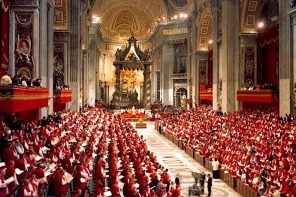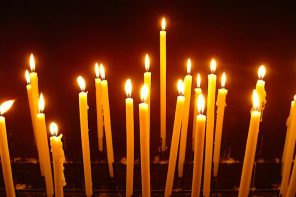DUBLIN – Here at Ground Zero of the Catholic Church’s collapse, the first Sunday of the new pope’s tenure coincided with St. Patrick’s Day.
And what better symbol of secularization’s subversion of the sacred, the central challenge facing Francis, than the picture of Ireland’s patron saint sharing a pint of Guinness with a leprechaun that I saw in a pub window.
Recent surveys show Catholics in the Republic of Ireland are deserting their faith faster than believers in almost any other nation worldwide. According to Irish and Vatican analysts, the current crisis was precipitated by revelations of widespread clergy sexual abuse but also fueled by the post-1960s spread of secular values, upending forty-plus years of a postcolonial, faith-based society. (After the establishment of the Irish Republic in 1922, the Church provided cultural cohesion for the new state.)
Statistics are one way to tell the story: In 1984, 87% of Irish Catholics went to weekly Mass. In 2011, Archbishop Diarmuid Martin said 18% of Dublin Church members attend services.
Images are another option: gaggles of green-bedecked youngsters and young adults line the St. Paddy’s Day parade route, but in Dublin’s cathedral youthful faces only speckle the crowd.
Three days of talking with Church leaders help put numbers and pictures in perspective. But their insights on the Church’s problems make the new pope’s task sound all the more difficult. Many of the Irish Church’s fiercest critics are also its most devoted sons and daughters, who came of age when the social teachings of the Second Vatican Council provided a religious foundation for post-’60s currents of cultural change.
Taking Matthew 25 to heart, Irish priests and nuns ministered in Guatemala, El Salvador, and Nicaragua. They protested against US militarism, supported Greenpeace, and agitated for human rights. When Pope John Paul II appeared to backtrack on the Church’s social commitments, they turned their reformist zeal to their own Church. His decisions to silence liberation theologian Leonardo Boff, nix the ordination of women, and reject the use of condoms to prevent the spread of AIDS in Africa seemed to signal an unwillingness to confront contemporary issues with a Christ-like openness to the present moment.
Neither the Association of Irish Priests (ACP) nor We Are Church, local organizations that, respectively, represent the Irish clergy and laity, are willing to accept the status quo. The abuse crisis provided an opening for their critiques of Church structure and hierarchy, but the present troubles, they say, are symptomatic of the hierarchy’s lack of transparency and accountability.
Fr. Sean McDonagh, co-convener of the 1,000-member ACP, wants to see women ordained and priests allowed to marry. But he also wants a more representative, even democratic, Church that is more concerned with issues of poverty and the environment than with policing sexuality.
‘What Jesus says about sexuality is miniscule next to what he says about power, money and position,” said the Columban priest, who has written extensively about imminent ecological crises.
McDonagh’s archbishop, Diarmuid Martin, is one of the few heroes in the Irish sex abuse scandal. In 2009, Martin opened the diocesan files, enabling victims to seek justice for clerical crimes. His example may not have endeared him to the Vatican, but it did ensure his popularity at home. Yet his overall interest in reform comes nowhere near McDonagh’s or that of Brendan Butler, co-leader of We Are Church.
“The Archbishop is very good on child abuse but he’s critical of groups like ours,” Butler said. “He says we should looking for individual conversions, not for changing structures.”
That tension over the Church’s mission—to win souls or save society—goes to the heart of Ireland’s future as a Catholic country. Reformers like Butler and McDonagh say the Church’s chief problem, its irrelevancy to the everyday life of the people, would be solved by addressing vexing issues of economic justice, climate change, and social inequality.
And, by recognizing the rights of women and married men to ordination, the looming shortage of priests would be averted. Yet these kinds of substantive changes would require the Pope and the Curia to cede their power and undo more than ten centuries of authoritarian rule. For those who say the outcome would look a lot like Protestantism, Butler and McDonagh would disagree. They have no desire to become Anglicans or Methodists; Catholicism is their birthright, and its teachings their lodestar.
But Martin has another vision for restoring the Irish Church. He agrees that the Church has become irrelevant to many of his countrymen—“motions without emotions,” he explained—but the answer is personal renewal through a deeper, life-altering relationship with Christ.
This message was echoed in the St. Patrick’s Day homily at the local Cathedral, where Martin and Irish president Michael D. Higgins were in attendance. The Mass was entirely in Irish except for the sermon, which was repeated in English. Father Leon O’Giollain began by acknowledging the terrible suffering the Church and its followers had endured as the extent of its sex abuse came to light. Yet despite the quest for justice, individuals needed to forgive if they were to move on with their lives, he said. Citing the example of St. Patrick—an Englishman enslaved and abused by the Irish who, after escaping, forgave his persecutors and returned to convert them—O’Giollain seemed to echo his boss’ belief that individuals needed reconciliation as well as justice.
The Irish Church, if it is to win back hearts and minds, needs both. Reformers will not likely succeed on all fronts, but they are right to seek social relevance in the face of competing secular demands. Likewise, it may be impossible for individuals to move forward without forgiveness, and the recognition that despite the Church’s failings its basic teachings are solid. A similar move—forgiving past horrors in the hopes of a better, more just future—underlies Northern Ireland’s fragile peace. As one local told me, regarding church and state, “We need forgiveness to move on.”




